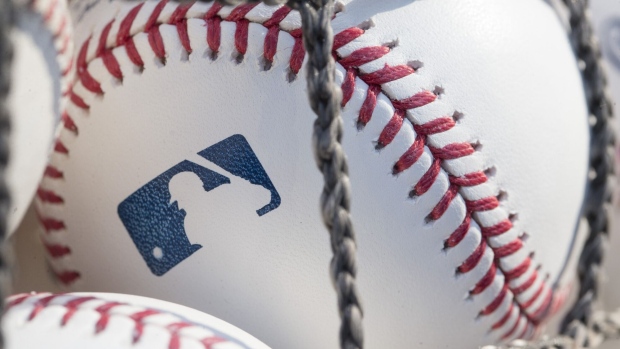Jun 1, 2023
MLB Boss Says Gambling Spat Caused Broadcaster Bankruptcy
, Bloomberg News

(Bloomberg) -- The executive chairman of Sinclair Broadcast Group Inc. threatened to push the company’s sports broadcasting unit into bankruptcy unless Major League Baseball officials approved new digital rights, including some to allow gambling on games, MLB Commissioner Robert D. Manfred said in federal court.
Manfred testified Wednesday about a tense meeting with Sinclair Executive Chairman David Smith concerning the financially troubled unit, which is the largest local sports broadcaster in the US. That unit, Diamond Sports Group, eventually filed for bankruptcy in Texas and has demanded a reduction in the television fees it must pay the teams it covers.
The two sides are scheduled to return to federal court in Houston on Thursday to finish arguing about how much Diamond must pay several baseball teams, including the Texas Rangers and the Cleveland Guardians, for the right to televise their games on the company’s regional sports networks.
US Bankruptcy Judge Christopher Lopez said he will rule at the end of the hearing on whether to force Diamond to immediately decide if the company will continue with the baseball contracts or cancel them. In big insolvency cases, such trials are rare; typically the disputes end in a deal.
The meeting between Smith and Manfred happened sometime before Diamond filed bankruptcy in March. Manfred said that Smith told him Sinclair would “start squeezing” MLB clubs so that Diamond’s regional sports networks could remain profitable.
If the teams didn’t agree, Smith threatened to put Diamond into bankruptcy and use Chapter 11 to selectively reject individual broadcast contracts. Doing so, according to Manfred, could give Sinclair leverage over the MLB because it could mean games wouldn’t be broadcast.
But Manfred said he told Smith that MLB would be prepared to step in and broadcast games on its own, if needed. Manfred also said he made clear the rights the Sinclair chairman demanded would never be granted.
Representatives of Sinclair didn’t immediately return emails seeking comment. Diamond Sports lawyer Howard Shapiro said Sinclair no longer has control over the local sports broadcaster and said Manfred’s testimony about Smith was irrelevant to determining the fair market value of the broadcast contracts, which was at issue in Wednesday’s hearing.
“It ended badly,” Manfred said of the meeting with Smith. “He wasn’t so happy when he left and, you know, neither was I to tell you the truth.”
His testimony comes one day after Diamond gave up its right to broadcast the games of the San Diego Padres. The company decided to drop the contract when the Padres refused to lower its fees, Diamond lawyer Andrew Goldman told the judge overseeing the company’s bankruptcy.
Bankruptcy Plan
Diamond is owned by Sinclair, which loaded up on debt to buy 21 regional sports networks from Walt Disney Co. in 2019 for $9.6 billion. Sinclair gave up control of Diamond as part of a plan to put the unit into bankruptcy and restructure its debt.
Manfred claimed Sinclair was raising money in the public debt markets by telling investors the sports networks would get digital rights that would allow the company to make money from sports gamblers.
Since Diamond landed in bankruptcy earlier this year, the company has been fighting with MLB about whether it will continue to broadcast games. Diamond has demanded the right to sell viewing services directly to sports fans, instead of through cable television. MLB has refused to sell those rights.
Diamond filed for bankruptcy in Houston, with a proposal to cut more than $8 billion in debt by giving ownership of the company to creditors.
Thousands of Games
The company’s channels show thousands of Major League Baseball, National Basketball Association and National Hockey League games to fans from Detroit and Phoenix to San Diego.
Diamond said it plans to restructure while continuing to broadcast live sports to fans. The company borrowed more than $600 million last year to build a streaming service, because so many fans have abandoned cable television.
One key question looming over the bankruptcy case is whether Diamond and the MLB can agree on new contracts. The company could cancel some of its current MLB deals or let them expire.
In the days leading up to the bankruptcy, Diamond withheld a payment to the Arizona Diamondbacks in a bid to secure the rights to put the team’s games on its streaming service and could look to get out of other team contracts.
The league has started hiring executives to produce and distribute games on its own. MLB.TV has about 3 million subscribers and is meant for fans who don’t live in the local market of their favorite team.
Regional sports networks are under financial pressure as more people cancel their cable-TV service, depriving them of a key source of revenue. Cord-cutting has hurt Diamond’s revenue and undermined its ability to service its debt load.
Diamond planned to stake its future on its own direct-to-consumer service, which launched last year.
The case is Diamond Sports Group LLC, 23-90116, U.S. Bankruptcy Court, Southern District of Texas.
--With assistance from Rheaa Rao.
(Updates with additional details in the third and fourth paragraph.)
©2023 Bloomberg L.P.





